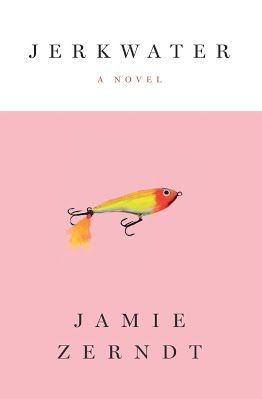Jerkwater
Jamie Zerndt
Literary Fiction

Date Published: August 2, 2019
About the Book:
Set in Mercer, Wisconsin, where tensions over Native American fishing rights are escalating, JERKWATER is a story about the racial tensions churning just beneath the surface of what often appears to be placid, everyday American life.
Read an Excerpt:
CHAPTER ONE: SHAWNA
There were spots in the lake where the anchor never hit bottom. The murkiness always fascinated Shawna. She knew it was only tangles of muskgrass and pondweed down there, but a part of her couldn’t help but imagine strange, never-before-seen creatures dwelling among the coontails and duckweed. Like Wisconsin anglerfish. Or some rare breed of dwarf whale. And maybe the lake was bottomless, like in those stories her mother used to tell her where Nanaboozhoo was always stumbling and laughing his way through the world.
Shawna dug around inside the cooler. Her journal was peeking out from under a tin of sardines. Ever since the day her stepfather had taken her mother away from her, the journal had become a sort of artificial limb for Shawna. Or maybe an artificial organ, a somewhat bulky and awkward replacement for what had been her heart.
“It’s not the world’s fault you’re lonely,” Shawna said out loud. It was something her mother used to say. The words came to her like that sometimes, like ghost ships sailing across the years, reminding her of who her mother had once been: a strong woman who’d been haunted by demons. White demons. Shawna picked up her journal and was sitting with her hand hovering over the page, waiting to take dictation from a dead woman, when she heard the muffled sounds of voices on the water. Then there was the echo of oars being worked in their sockets and a tackle box being slid across a metal hull. She lay flat on the ground, peering through the reeds, and spotted a man rowing quietly toward the island. There was a little boy in the boat, too, a little lump of a thing bundled up in a too-big camouflage coat and looking barely old enough to handle the pole he had dangling over the edge. Then, just as she thought they might row past, the man dropped anchor about forty feet out.
Shawna lowered her head and wondered about her boat, if they could see it. As she lay there frozen, she noticed a turtle sunning itself on one of the larger rocks near the island. It was an ugly thing with a head like a wrinkly old penis. The shell, though, was beautiful, almost like the yellow undercoating and the elaborate black hatch-marks were trying to make up for its unflattering head.
“You want me to do it?”
“No. I can do it.”
“Then take this one. He’s nice and fat.”
Shawna couldn’t see their faces all that well, but it was definitely them. It was like they were all in the same room together, the walls made of the mist still clinging to the lake. There was the crack of a can opening. Soda maybe. Or beer.
“You hungry?”
“No.”
“You sure?”
“I’m sure.”
The room became hushed, and Shawna watched the two figures hunched over their rods, waiting. For the man, the waiting seemed like a kind of forced meditation, like something he wasn’t all that interested in but that came with the territory of fishing. As for the boy, he didn’t seem to want to be there at all. That much Shawna could tell without seeing his face.
“Here.” The man handed the boy something. “Eat.”
“When we get back can we--?”
“Quiet. You’ve got a bite.”
Shawna watched the boy’s bobber. There were little ringlets pulsing out from it like sonar. Then nothing.
“I think he ate my worm.”
“Maybe. Reel it in a little.”
The boy slowly reeled his line in, letting it stop every few feet or so. Then the bobber suddenly disappeared.
“Look!”
“Okay, okay. Let him take it now. That’s it.”
“Can I reel him in now? Can I?”
“Did you set the hook?”
“I don’t know.”
“Give it a little tug. Not too hard now.”
Shawna could see the boy yank on the line, lifting the pole over his head.
“Jesus, you’ll be lucky he still has a mouth left on him.” The man went about getting his net ready and leaning over the side of the boat as the boy pulled the fish closer. “See, I told you this was a good spot. Didn’t I tell you?”
The man lowered the net into the water, but when he brought the fish up, it didn’t appear all that big to Shawna. Maybe a bluegill or sunfish. She watched as the boy reached into the net and was sprayed with water as the fish flipped and arched about. The man put the net down on the floor of the boat, no doubt stepping on the fish to keep it from flopping about, then ruffled the boy’s hair before carefully pulling the fish from the net and placing it on a stringer. Shawna figured they’d probably go home now, but the boy went back to staring blankly out at the water while the man began casting a bright yellow lure closer and closer to the bank of the island. Shawna guessed he was going for Muskie now since they were known to hide in weed beds. Ojibwa called them maashkinoozhe. Or “ugly pike.”
“Can we go soon?”
“Soon, Jack.”
Shawna knew all too well who they were: Peyton Crane and his little boy. She’d made a sort of hobby over the past year or so of casually stalking them. Lately, though, it had become less casual. She noted the day and time in her journal next to the others.
Something was slid across the hull of the boat. “Here, have a pretzel. We’ll go back soon. I promise.” Peyton stood up in the boat, and Shawna got her first clear look at him. He was wearing a brown flannel jacket and a camouflage baseball cap, his dumb brown hair sticking out the back like burnt straw. The beer belly pushing out against his flannel made him appear older. And pregnant. Shawna smiled to herself. If that were true, ninety percent of the white men in town would be knocked-up.
Shawna watched as the turtle, apparently having had enough of all the commotion, waddled off his rock and into the water. The turtle reminded her of a story her mother used to tell her about the world being flooded and Nanaboozhoo sitting on a log searching for land. In the story he tried to swim to the bottom of the lake to grab a handful of earth so he could create a new place to live, but the lake seemed bottomless. A loon, a mink, and a turtle also tried to reach the bottom, but all of them failed. Finally, a little muskrat tried. The muskrat didn’t survive, but when his lifeless body floated to the surface, they found a ball of earth still clutched in his paw. Nanaboozhoo put the ball on the turtle’s back and with the help of the wind from the four directions, the dirt grew into an island which is now North America. Ever since then, Ojibwa have revered the muskrat for his sacrifice, and, also the turtle for literally bearing the weight of the world.
As Shawna daydreamed about the turtle down below holding up the island, she heard something clatter in the branches overhead. There, not a foot away, was a lure with a treble hook swaying and glinting in the sunlight.
“Jesus H. Christ.”
Peyton stood up and began yanking on the snagged line, rocking the small boat back and forth so that the boy was forced to set his pole down and grab the oars for support.
“Shit if I’m going to lose another lure to a goddamn tree.”
When he eventually gave up and began reeling in the anchor, Shawna pulled the lure down and set the line between her teeth. It took a few bites but soon the lure came free and the line went slack. Shawna could see the boy staring intently at the island, and, for a brief moment, it seemed like they were staring at one another. Almost like the boy had seen what she had done but had decided to remain quiet.
“Look. It came free.”
Peyton turned to see his line lying limp and flaccid on the water, and Shawna thought she could see a smile spread across the boy’s face.
“You promised we could play video games, ‘member?”
Peyton stared hard at the island, like the thought of leaving the lure there somehow meant the island had won.
“Yeah, I remember alright.”
He then worked the boat around with one of the oars and began rowing them back across the lake. Shawna rolled over on her back and studied the lure in the sunlight wobbling its way through the leaves. It was a simple lure. Wooden. Handmade. She wondered idly if Peyton had ever caught anything with it. Save Two Walleyes – Spear A Pregnant Squaw. Too Bad Custer Ran Out Of Bullets. She remembered the protests and the bumper stickers on the boats from when she was a girl. She remembered, too, the hate white people had spewed at her relatives as they tried to dock with their boats full of walleye. “Ignorance,” her mother had told her, “is a dangerous thing. But now at least you know its face.”
She turned the lure over in her hand, her fingers tracing the lines of the treble hook, pushing the barb gently against her thumb. She found herself thinking about the ceremonies the Plains Indians used to have where the boys pierced their skin with hooks and suspended themselves from chains as a rite of passage. She rested the lure against her shirt, brushing the metal back and forth across the cotton. She wondered how much pain a person could endure. She wondered if enjoying it would somehow invalidate it.
Just as she was imagining her own skin being pulled and stretched, a moth landed on her knee. A gypsy moth. She recognized it because she always thought their floppy antennae made them look like little flying rabbits. They were hated by both whites and Chippewa alike because they were destroying large swaths of Wisconsin forest. It was one of the few things both agreed on. Shawna shooed the moth away, watching as it flitted up into the tree to work its mayhem, and rolled over onto her stomach before tossing the lure into the cooler.
She watched the now tiny boat as it docked along the southern edge of the lake. The poor kid didn’t stand a chance. Whether he wanted to be or not, he was a racist-in-training. Half the kid’s heart was probably already polluted, and by the time he reached high school, his insides would be entirely black. And what was worse was that things would continue on like that, the kid growing up, having his own kids, and then infecting them. And on and on and on. Like a cancer. Or like a gypsy moth making its home in the family tree. There was nothing for it to do but spread disease.
About the Author:

Jamie Zerndt is the author of THE CLOUD SEEDERS, THE KOREAN WORD FOR BUTTERFLY, and THE ROADRUNNER CAFE. His short story, “THIS JERKWATER LIFE”, was recently chosen as an Editor’s Pick in Amazon’s Kindle Singles store. He received an MFA in Writing from Pacific University and now lives in Portland, Oregon, with his son.



thanks for hosting
ReplyDeleteYou're welcome!
Delete